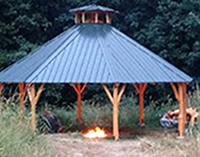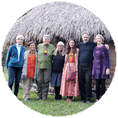Christine Staub, SFC Firekeeper from Greensboro, NC, conducted the interview for us.
Bill Sutton accepted the role of Executive Director of the Sacred Fire Community in February 2013. He spoke to us from his home in Lakewood, Colorado as he was preparing to move to Mesa, Colorado.
Christine: Bill, I’m delighted to have this opportunity to interview you. I know that many in the Sacred Fire Community (SFC) are eager to get to know you and especially to hear about what’s going on at the leadership level of the SFC . We are, after all, a rather far-flung organization, with affiliated SFC communities in North and South America, Europe and Australia. In the case of my hamlet until we hosted our first Grandfather Fire[i] in 2011 our local community members had no concept they were part of a movement that has spread (like fire!) all the way across the world in a little more than a decade.
Bill: That’s perfect because I have a LOT of things I have wanted to communicate, and doing so in the context of an interview is a great opportunity. One thing I’d like the community to know from the outset is that I really appreciate and thrive on honest feedback. I even appreciate angry feedback if the situation is direct and fair. I welcome the opportunity to work things out with someone, to be genuine, to express vulnerability and discover areas of hidden blindness. An astrologer told me 30 years ago that I should find myself working for an organization, rise to the front and then I’d be in a position to learn something in this life. So this is a precious opportunity for me.
C: Let’s dive right in then. How has your life’s journey prepared you for taking on the role of Executive Director at this particular point in the growth and evolution of the Sacred Fire Community?
Bill: At age 17, I had some experiences that opened me to a spiritual life. I had a lot of questions. I saw that the world didn’t work at all the way I was taught or thought it did and I was asking, “What should I do with my life in this world the way it is?” I was actually wailing to the universe “Help. I need a teacher”.
That teacher came in the form of Chögyam Trungpa Rinpoche. He had come from Tibet and was part of a vajrayana Buddhist lineage that traced itself to the time of the Buddha. He came to the U.S. and essentially started working with hippies and beat poets and physicists — whomever he found ground with — to structure a society known today as Shambhala. I heard him speak and read his book The Myth of Freedom, and just had to go study with him. Trungpa Rinpoche had a very large view and a very trustworthy voice. He stated the obvious, something so clear you couldn’t argue with it, very much like when we receive teachings from Grandfather Fire.
A core teaching within Shambhala is related to creating enlightened society. I was very interested in looking at how that works and how government and leadership could manifest a sacred view of existence, trusting people’s nature and supporting their spiritual connection to the world, instead of just trying to manipulate and control them for fear that chaos would ensue.
Anyway, I packed my bags and went to study at Naropa University, the liberal arts college Trungpa Rinpoche had founded in Boulder, Colorado. The Vajradhatu/Shambhala community, practices and projects became a close part of my life for the next 30 years. Very soon I was working within Shambhala administration on various levels and ultimately found myself working in the Office of Practice and Education. I managed very large advanced meditation/teaching programs which would last anywhere from a week to three months. For some programs we would have 50 people on staff, and a key part of the training was how to demonstrate enlightened society so that it could provide a reference point for attendees for the rest of their life.
One thing I found was that if someone is in a central leadership position, and becomes the expert and tries to control things, that doesn’t work. When that person dies or moves on, what happens then? These roles (like mine as Executive Director) are not identity positions. We should not attach our longing to be meaningful in our life to a role. That feeling should be reserved for our relationship with the Divine. With that perspective we can see that we can be useful at a particular time, but eventually we will need to move on.
C: Right now it is others who have moved on after offering their very meaningful contributions and it is you who has stepped in. So what is this phase of SFC growth asking of you?
One of the things I often find myself doing in this life is starting things. The Sacred Fire Community arose in the mid to late 1990’s, and it has reached a stage of growth in which there are inevitable growing pains. If you ask people to tell the Story of what the SFC is, who its members are, a lot of people tell Eliot Cowan’s or David Wiley’s story, or even their own individual stories (in some way these would make great fantasy novels or adventure stories). But when we start talking about the group story, we see there has been a lot of grassroots energy and inspiration springing forth from a pandora’s box of projects that Grandfather opened up and the way he helped each person connect with their life purpose. From this, great things and great inspiration have emerged.
But over time something else less visible happens — something that people naturally do but which creates a growing pain. Without realizing it, the initial adopters have congealed their “family.” They have found their place in our world and there is little room for anyone else — at least not a great influx of people to come in and find similarly meaningful roles themselves. All the positions — not administrative positions, but subtle societal positions — are taken and it seems hard to penetrate. Relationships have been formed, along with deep interpersonal knowledge. When new people move into positions, the original folks might feel, “wow, I’m just being tossed out to pasture,” that which has given my life meaning is changing.” Or they feel they can’t trust someone because they don’t yet know them. From the outside, this can look like a “good old boys” network. Most people who have been around for a while think of about 100 people when they think of the community. The fact is we are already well over 2000 people going to the various community fires, but like you mentioned earlier, most are not exposed to the larger community. And we have not developed a way to communicate who we are to the uninitiated (using the term loosely) very well yet. The fact is, we have to find a way to explain ourselves so it doesn’t narrow us down to a belief system or make us into a tradition, like “those SFC guys”, an ego in the realm of spiritual identity politics. That’s not the living experience WE have. No one is interested in that. Instead, we have to find a way to invite a much larger group of people in to find out for themselves and to feel included and needed in our reality.
Before I stepped into my role there were four executive directors. I imagine that must have been a difficult structure with those four trying amongst themselves to work things out in the face of community members (meaning ALL the people who have committed themselves to supporting Grandfather’s work) each having their own expectations of what should be a priority. To some extent the squeaky wheel would get the grease. We have to remember that everybody is a volunteer, and moreover we each have come to the Fire in various ways, each with our own personal connection to the Divine, our own personal life core purpose and our own unique set of lessons that need to be learned and wounds that want to be healed. There is no membership per se. At some point our group project, which was working really great with a lot of enthusiasm, was running into some really difficult walls. The culturally inherited mistrust of those with perceived “power over” started creating rumblings and lack of cohesion. What I see is needed now is a mutual understanding that we’re less about implementing some person’s or group of people’s vision for how the world should work or how to fix it. We’re more about respecting, listening and opening to move with this sacred world the way it is and has been since the time before time. Above all we’re about learning. What we feel strongly about today, we’re open to seeing as an obsessed blindness tomorrow. This is very different than the aggression of social justice warriors or people — religious movements, utopian idealists, etc. — bound together based on a dogma or an agenda of how they will right the world.
C: That’s quite a situation to step into. So what kind of authority DO you have as SFC Executive Director?
Bill: Well, one thing I DON’T have is any authority over anybody’s spiritual life! I don’t even have voting power on the community organization’s board. My mandate right now is to oversee the development of systems that create a basis to grow on a very large scale — to make connection to the fire and life cycle living available to the many many people who long for it, whether they realize it yet or not. I feel that an essential part of that is establishing an environment in which we understand how deeply the energy held by the various administrators and coordinators affects the whole. We must be respectful. We need to be kind and patient in talking to people while having good boundaries to protect and nurture the work we are doing. There has been a hint of blame-orientedness within the SFC membership that we need to get beyond. We need to remember that everybody is a divine expression and is working to learn. It’s as simple as that. Shambhala calls this “basic goodness.” We call it something like “divine expression.” Same thing. Everybody wants to be in a good way within themselves and in the world. What we need to focus on now is “What are we going to do to move forward in the great task we have been given by the divine to help this world?”
C: So what are some of the priorities that you see regarding “moving things forward”?
Bill: We have to find a better way to communicate who we are. It’s easy to say, “lose your mind, find your heart.” That sound bite played a key role at one point but the real message is more about mind being in service to heart than in ditching the ability to speak and think well. We need an engaging introduction to the perspectives that we are reintroducing, particularly for new people. We can’t think that by showing up to a Fire someone just magically “gets it.” Did that happen to you? For me it took several Grandfather Fires and some grizzly healing work for things to come into focus and trust/devotion to arise in my being. And after that, I still needed more healing! That’s just what it took to adjust my perspective. We have to get clear about what our unique contribution to the world is. Not just a message that says “Come to the Fire, and it’ll all be revealed” or “The sacred and interconnected nature of all life.” Yes, both of those things are true, but without deeper ways of communicating and engaging, these can sound like New Age fluff.
With our messaging honed, we’ll revamp our website and materials to better represent what we’re about to people off the street, how we relate to the other Sacred Fire organizations[ii] and healing paths, and to offer a lot more connectivity. We are looking forward to creating a forum for having topical interest groups and places of exchange, and getting an economic network started where we can support each other through exchanging services. There needs to be an emphasis on helping with the fundamentals of living life. A real community is not there just to help each other through emotional crises or once a month at the fire. What creates real community is that in the same way that you commit yourself to others, they also commit themselves to you. A sense of home and anti-isolation that provides the stage where you can bring forth your divine gifts, where people want your gifts because you mean something to them and where the values of understatement and humbleness can once again be appreciated. But for it to become really real, it needs to provide support for the necessities of life and a place where your value and contribution to life itself has tangible meaning.
There is a comprehensive Firekeeper manual that is being worked on which will give the Firekeepers — who hold an extremely important position of being the first person new people meet — the teachings, perspectives and tools they need to feel empowered, resourceful and aligned in embodying what we are about. This is ultimately seasoning a deepened understanding within all of us so that what we say is both naturally aligned and authentic.
Next we have Lifeways. The Lifeways programs, which support the journey of human life from birth to Death and Dying, are not extracurricular activities. They are core to who we are. Coming to the Fire is inseparable from opening yourself to the Life Cycle Living perspectives that Grandfather has introduced. It is about bringing Fire — heart — into our lives, which naturally opens to our unavoidable participation in the cycles of life. There are many more offerings to come in this area.
The big thing we’re focusing on at the same time is putting systems in place so that we can really invite a lot more people in, and when those people come in, what they find at the entry point — be it a fire or a lifeways program — is in line with what the marketing has promised. We need to have the infrastructure in place for promotion, registration, volunteer staffing and running programs effectively. Some hamlets have worked these things out on their own; now we’re using their collective wisdom to create a common system that can support future events, which could be especially helpful in smaller communities. We also just got our 501c3 status, giving us the right legal fit for who we are. Adapting to that and the organizational shift that accompanied it (having a board, etc.) has been a big learning curve.
When these things are in place, we will shift our focus to opening our doorways to many, many more people, many of whom are starving for what Grandfather has asked us to bring into the world.
C: Bill, I realize I’m not really clear who else is helping hold the vision of the SFC.
Bill: Well, people should know that the “generator” and guider of the vision is Grandfather. Then we have a Board with David Wiley temporarily serving as Chairman. We had to plead to get him on loan from the Sacred Fire Foundation,ii since he is the repository of Grandfather’s plan for the community organization’s evolution. With his background as a management consultant, he has helped craft an interim strategic plan, which has given us a phased development process and point of focus for what we need to do over the next few years. The Leadership Guidance Group (Board) includes Susan Skinner (Treasurer), Karen Fernandez (Secretary/Development) and Roger Menadue. Then we have the Community Service Team, which comprises the directors of the core areas: Sherry Boatright (Lifeways), Annie King (Firekeeping), Dave Wiley (Outreach) and Jeff Bartlett (Central Event Coordinator). This is our structure for phase 1, which is about getting the fundaments in place. In phase 2, we’ll be focusing on greater outreach to the outside world, and we’ll adjust our team structure to reflect the expanded focus.
C: Thank you for that. Bill, will you share with the readers a little bit more about yourself personally.
Bill: It might surprise people that I’m actually quite shy. I have many passions, and I’m a real “generalist” when it comes to things I’ve done. I started out as a piano performance major in college and I still play piano. I love music and playing music. I played the guitar in rock bands, the first one at age 14 (the “Caped Crusaders” — and yes, we played “Batman”). I left the piano performance career when my spiritual longing took me to Naropa University where I received a degree in Buddhist Studies and Psychology.
For most of my careered life I’ve been involved in publishing, writing/editing, coordination/administration, and web development — which includes a lot of things like marketing/communication and understanding systems of all kinds, such as organizational, business, and legal structures. I’m passionate about learning things, and I listen to a wide variety of podcasts — not just to learn what’s happening in the world, but even more to find out what’s being said and shaping people’s understanding of the world.
It’s ironic that I use technology a lot, including in my career as a web developer, because technology so often leads people to be increasingly disconnected from personal, heart-centered interactions, and I’m clearly not a fan of that. But I am grateful for the paradox of being so totally immersed in it that I can relate to where a lot of people are stuck, and for the ability to see what’s coming over the horizon.
Other things — I love to cook, all kinds of food (including salt free!). I like traveling and long to visit places on this earth like Bhutan, which is still living from an ancient wisdom perspective. And my deepest longing is to live in a community situation where people share a common deep wisdom perspective of the world.
C: Thank you so much for taking almost three hours to talk with me. I find everything you have shared very inspiring. If a reader feels called to support the healthy evolution of the SFC, what would you advise to them? Who should they talk to?
Bill: Well, the first thing is to get involved with your local community. Ask your Firekeeper what you can help with. There’s always a need there, and participating in this way will allow you to find meaning in what others have to offer and for them to find meaning in what you have to give. You’ll have a lot of good times and learn a lot about yourself and life. If you haven’t done so, go to a Grandfather Fire — as many as possible. This is an EXTREMELY RARE opportunity, which we should never take for granted. And if you are one of those people who by design has to work with large impossible tasks, write me an email and I’d be happy to play my role in burdening you with projects and learning experiences beyond your wildest dreams! (he he he)
My email is: bill@nullsacredfirecommunity.org.
C: Thank you Bill.
[i] For more information about Grandfather Fires, see here. [ii] The Sacred Fire Foundation and the Blue Deer Center are sister organizations to the Sacred Fire Community, all springing forth under the guidance of Grandfather Fire.







I really liked the interview, well done Bill and Christine.
What a wonderful and insightful interview! Thank you Bill for sharing your wisdom with such an amazing clarity about the work of the SFC.
Thank you Bill for taking the SFC organization on. Thank you Christine for the interview and for re-launching Around the Fire! You’re both treasures.